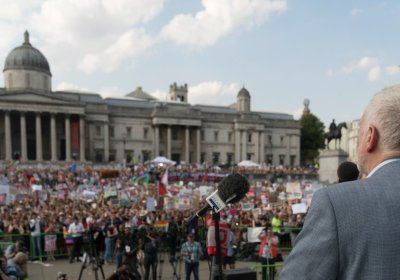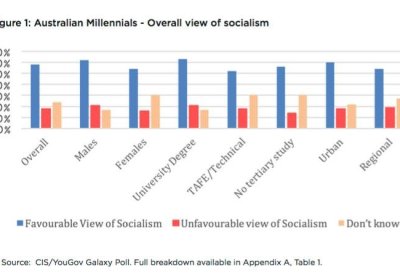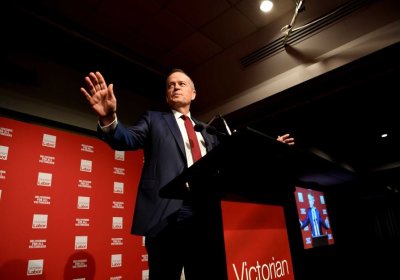The European Union elites have rejected British Prime Minister Theresa May’s Brexit proposals (known as the Chequers plan) on the basis that they breach the fundamental principles of the EU; i.e. the internal market and free movement. Alan Davies write that this has increased the likelihood of a disorderly (“no deal”) exit from the EU — and increased support for a second referendum on the issue.
Jeremy Corbyn
From taxing tech firms to pay the license fee to creating a new British Digital Corporation (BDC), the Alternative MacTaggart Lecture by British Labour’s socialist leader Jeremy Corbyn in August unveiled an array of potential new Labour digital policies, writes Nick Webb.
These proposals are not yet official party policy, but they give a good sense of where Labour’s leadership is headed as it develops its offering ahead of a potential Brexit-related snap election.
The British Labour Party took a radical, anti-austerity manifesto to last year’s general elections and, despite polls and media commentators expecting an unprecedented disaster, came close to winning, denying the ruling Conservatives a majority. Despite this success, attempts to attack and sabotage Labour’s socialist leader Jeremy Corbyn, and the ranks that support his vision, have continued. Michael Calderbank takes a look at what took place and what it means for the party’s future.
Tory-supporting media have been portraying Britain’s socialist Labour Party leader Jeremy Corbyn as a Soviet fellow-traveller. Meanwhile, Hilary Wainwright notes, Labour’s shadow chancellor and close Corbyn ally sets out a vision that breaks with the old bureaucratic state model.
Shadow chancellor John McDonnell can usually barely breathe a word about nationalisation without setting off a media frenzy, so it’s strange that his most interesting comments yet on the subject passed with so little comment.
The latest campaign against British Labour Party leader Jeremy Corbyn centres around the veteran anti-racist campaigner’s alleged anti-Semitism. Among the ongoing claims, Corbyn is denying allegations he laid a wreath at grave the killers of Israeli athletes at the 1972 Munich Olympics.
As well as the latest attack on Corbyn, it is clear the allegations are also aimed at demonising all solidarity with Palestine and support for a genuine peace based on justice.
The increasingly strident charges of anti-Semitism within Labour, and the widening circle of targets, have by now departed from all reality.
Populism Now! The Case for Progressive Populism
David McKnight
New South, 2018
177 pages, rrp $29.99
David McKnight’s Populism Now! catches a wave of discussion about the chances for a progressive “populism”, writes Jonathan Strauss.
Also in the spray, for example, is a June Quarterly Essay piece by the Australia Institute’s Richard Denniss “Dead Right: how neoliberalism ate itself and what comes next” and the previously post-whatever Chantal Mouffe’s musings on “left populism”.
Britain’s Conservative Prime Minister Theresa May is in dire trouble and likely to be voted out of office by her own MPs when parliament returns in September, writes English socialist Phil Hearse.
Labour Party leader Jeremy Corbyn joined the mass protest against Donald Trump in London on July 13 where he said the message to the U.S. president was a call for a "world of justice not division."
Speaking from Trafalgar Square to an enormous crowd after hundreds of thousands marched through the streets of London, Corbyn praised those gathered for "asserting our right to free speech and our right to want a world that is not divided by misogyny, racism, and hate."
Establishment media are rife with speculation that senior Labor MP Anthony Albanese may be preparing for another tilt at opposition leader.
Albanese has stated he is not.
But you never know what to believe in these days of revolving door leadership swaps, where pragmatism has replaced principle in both the major parties.
The Centre for Independent Studies (CIS), a right-wing think tank, is not at all happy with the results of a survey they commissioned from international polling agency YouGov Galaxy to find out the attitudes of “Millennials” (people born between 1980 and 1996) in Australia to socialism and capitalism.
The poll found 58% were favourable to socialism and 59% thought that “capitalism has failed and government should exercise more control of the economy”.
'Class consciousness is knowing which side of the fence you’re on. Class analysis is figuring out who is there with you.' — Slogan from a 1970s poster, author unknown.
The newly formed "Industrial Left" faction of the Australian Labor Party (ALP) in Victoria combined with the right at the party's state conference on May 28 to block discussion about imposing a 90 day time limit on offshore detention.
- Previous page
- Page 3
- Next page







